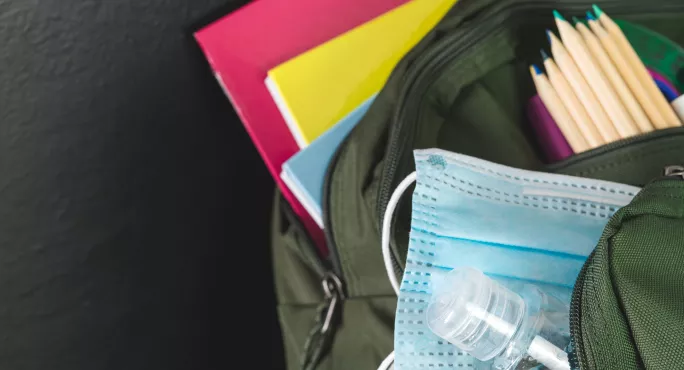New Covid safety guidance for Scottish schools

Scottish government guidance designed to reduce the risks of Covid-19 in schools has been updated this afternoon (Friday 17 December) to take into account the Omicron variant.
It includes details of the controversial plan to allow an exemption from self-isolation for some staff in “vital public services” - and “the education sector falls within that definition”.
Generally, safety measures that were already in place “must continue to be strictly followed” and some that were previously relaxed are being reintroduced.
The new approach is to be applied by schools “as soon as they can from the start of the January term”.
To apply for exemption from self-isolation, schools or local authorities must be able to demonstrate that:
- “a school is impacted by staff shortages as a direct result of self-isolation requirements”;
- “those staff shortages are in danger of putting essential functions and services at risk”; and
- “all other options to address pressures on operations have been exhausted”.
The guidance adds: “In the case of schools, this means considering exemptions in order to avoid school buildings closing and avoiding moving to remote learning where possible.
Background: Teachers in Scotland can ‘volunteer’ not to self-isolate
Testing times: How to improve Covid testing uptake in schools
Data: School staff off for Covid reasons hits a high for this term
“Staff who volunteer not to self-isolate must only do so following a risk assessment of their personal circumstances, and the employers’ duty of care to all their employees must be respected.”
Staff must also meet several criteria for exemption from self-isolation, including: having had their second Covid-19 vaccination more than 14 days ago; having no Covid symptoms of Covid-19; having evidence of a negative PCR test; and taking daily lateral flow tests for up to 10 days after being exposed to the virus.
The guidance also states: “Staff who cannot reasonably isolate from ongoing exposure to a Covid-19-positive household member should not volunteer to return to work.”
It advises that responsibility for assessing exemptions rests with local authorities, but adds that in event of “an outbreak situation the local health protection team can override exemption from self-isolation”.
The guidance also stresses that “exemption from isolation is also only applicable to the place of work, and cannot be treated as a blanket exemption for other purposes”.
Independent and grant-aided schools, meanwhile, can also request an exemption, if school managers “demonstrate the same level of evidence” required of state schools.
Other key points from today’s guidance include:
- A stronger approach to minimising contacts, primarily by “reintroduction of groupings where practical”
- A “strengthened approach to self-isolation for household contacts of positive cases”
- Tightened restrictions on school visitors
- Updated guidance on regular ventilation and CO2 monitoring
- Measures designed to increase uptake of regular asymptomatic testing
- Updated guidance on school visits and trips
- A requirement that schools and local authorities provide “essential support for particular groups, including vulnerable children and young people”, in event of temporary school closures at a local level
The Scottish government stated this afternoon: “Local authorities and schools should implement the changes as soon as they can from the start of the January term.”
Updated guidance for early learning and childcare, childminder and school-age childcare services has also been published.
Education secretary Shirley-Anne Somerville said: “Throughout the pandemic, our priority has been to keep our children, young people and staff safe. These changes reflect the threat presented by the rapid spread of the Omicron variant, and they will be reviewed on an ongoing basis.
“The updated guidance has been informed by advice from the Advisory Subgroup on Education and Children’s Issues and senior clinicians, based on the latest public health assessment of the situation, with input from the Covid-19 Education Recovery Group.”
Ms Somerville added: “In addition to the changes, it’s more important than ever that safety measures already in place in schools are strictly followed. These include physical distancing, one-way systems and the correct use of face coverings.”
The guidance can be found here.
You need a Tes subscription to read this article
Subscribe now to read this article and get other subscriber-only content:
- Unlimited access to all Tes magazine content
- Exclusive subscriber-only stories
- Award-winning email newsletters
Already a subscriber? Log in
You need a subscription to read this article
Subscribe now to read this article and get other subscriber-only content, including:
- Unlimited access to all Tes magazine content
- Exclusive subscriber-only stories
- Award-winning email newsletters
topics in this article



